As we continue to navigate through the uncertain times of the COVID-19 pandemic, there is never a better time to focus on strengthening our immune system. One way to do this is by incorporating immune-boosting foods into our daily diet. From garlic to dark chocolate, there are plenty of natural and delicious options available. In this article, we will explore a variety of these options and discuss how they can help boost our immune system naturally.
Why is a strong immune system important?
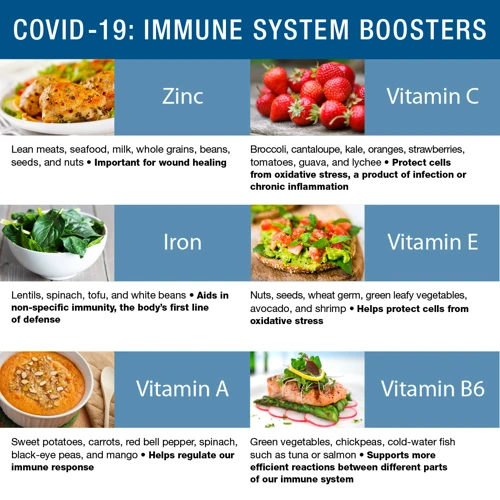
A strong immune system is important because it acts as the body’s defense mechanism, protecting us from harmful substances, such as viruses and bacteria, that can cause diseases. When the immune system is working properly, it can identify and destroy these harmful pathogens, keeping us healthy and free of illness. However, a weak immune system can leave us vulnerable to infections and illnesses.
There are many factors that can weaken the immune system, including poor nutrition, lack of sleep, high levels of stress, and a sedentary lifestyle. On the other hand, a balanced diet rich in immune-boosting nutrients can help strengthen the immune system and improve overall health. These nutrients include antioxidants, probiotics, and vitamins, such as vitamin C.
In addition to protecting us from diseases, a strong immune system also helps the body cope with stress. Stress can suppress the immune system, making us more susceptible to illness. By keeping the immune system strong through a healthy diet and lifestyle, we can better manage stress and reduce the risk of illness.
Maintaining a strong immune system through a balanced and nutritious diet is essential for optimal health and wellbeing. By incorporating a variety of immune-boosting foods into our daily diet, we can improve our immune function and protect ourselves from illness. In addition, immunity-boosting soups can be a great addition to our winter diet to keep our immune system in tip-top shape.
Garlic
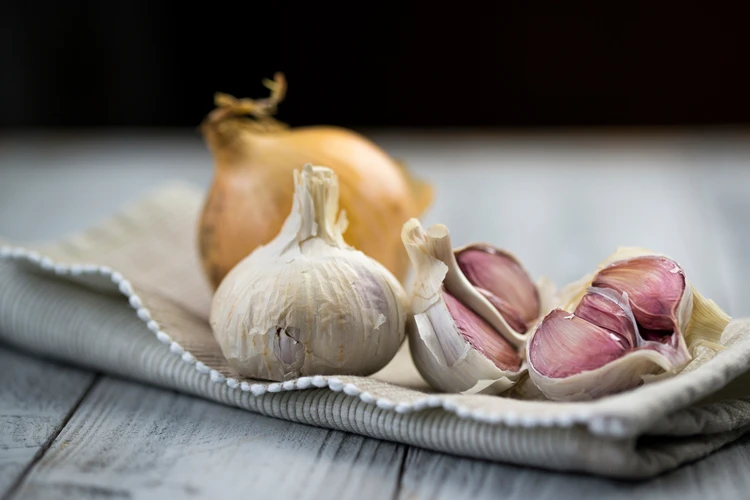
Garlic has been used for centuries not only as a seasoning but also as a traditional remedy in different cultures worldwide. This herb has long been recognized for its potent medicinal properties and is considered one of the healthiest foods you can eat. Garlic is known for its ability to boost your immune system naturally by fighting off harmful invaders, such as viruses and bacteria, that can cause infections and diseases. Scientists have found that the sulfur compounds in garlic can enhance the activity of immune cells and increase the production of cytokines, which are essential in fighting off infections. In the next sections, we will learn more about the health benefits of garlic and different ways you can incorporate it into your diet.
How Garlic Helps Boost Your Immunity
Garlic is one of the most potent foods for boosting the immune system naturally. It has been used for centuries for its medicinal properties, and modern research has confirmed its numerous health benefits. Garlic is known for its high concentration of sulfur-containing compounds, particularly allicin, which gives it its distinct flavor and aroma. These compounds have powerful anti-inflammatory and antioxidant effects, making garlic an excellent food for strengthening the immune system.
Anti-inflammatory Properties: Chronic inflammation can weaken the immune system over time, making it less effective at fighting off viruses and bacteria. Garlic has been shown to reduce inflammation in the body by inhibiting the production of pro-inflammatory cytokines. This can help to protect the body from harmful inflammation and support overall immune function.
Antioxidant Properties: Garlic is also a rich source of antioxidants, which are compounds that protect the body against damage from free radicals. Free radicals are unstable molecules that can damage cells and tissues, leading to inflammation and chronic disease. The antioxidants in garlic help to neutralize free radicals and prevent oxidative stress, which can weaken the immune system.
Immune-Boosting Properties: In addition to its anti-inflammatory and antioxidant effects, garlic has been shown to have direct effects on immune function. Studies have found that garlic can stimulate the production of immune cells like T-cells and macrophages, which play a key role in fighting off infections. Garlic has also been shown to have antiviral and antibacterial properties, making it an excellent food for preventing and fighting infections.
Garlic is a powerful immune-boosting food that can provide many benefits for overall health. By reducing inflammation, providing antioxidant protection, and stimulating immune function, garlic can help to keep the body healthy and strong. To learn more about the importance of antioxidants for immune strength, check out our article “Antioxidants for Immune Strength”.
Ways to Incorporate Garlic in Your Diet
Garlic is a versatile ingredient that can be easily incorporated into various dishes. Here are some ways to include garlic in your diet:
| Method | Description |
|---|---|
| Raw | Crush garlic and let it sit for a few minutes to activate its immune-boosting properties. Then add it to dressings or dips. |
| Cooked | Add garlic to stir-fries, pasta dishes, soups, or roasted vegetables. |
| Roasted | Roast garlic in the oven and spread onto bread or mix with mashed potatoes. |
| Pickled | Make pickled garlic and add it to sandwiches or enjoy as a snack. |
Incorporating garlic into your diet is a delicious and easy way to boost your immunity.
If you want to learn about other foods that can help boost your immune system, consider checking out probiotic-rich foods or vitamin C-rich foods.
Spinach
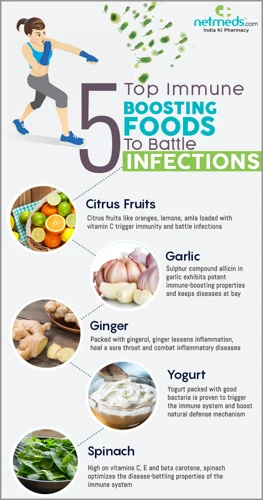
When you think of nutrient-dense leafy greens, what’s the first thing that comes to mind? Spinach might not be the obvious choice, but this under-appreciated vegetable is actually one of the healthiest items you can add to your diet. Packed with vitamins and antioxidants, spinach has been shown to boost immunity and improve overall health. In this section, we’ll explore how spinach can benefit your immune system and provide easy ways to incorporate this versatile veggie into your meals.
How Spinach Helps Boost Your Immunity
Spinach is a nutritious leafy green vegetable that helps strengthen the immune system. This is because it is packed with vitamins, minerals, and antioxidants that have immune-boosting properties.
Vitamin C: Spinach contains a good amount of Vitamin C, a potent antioxidant that helps protect the body against free radical damage and boosts the production of white blood cells – the immune system’s first line of defense.
Vitamin A: Spinach is also rich in Vitamin A, which plays a crucial role in maintaining the integrity of the respiratory and digestive tract, the skin and the eyes.
Vitamin E: Another antioxidant found in spinach is Vitamin E, which helps fight off infections and reduces inflammation in the body.
Iron: Spinach is an excellent source of iron, a mineral essential for the proper functioning of the immune system. Iron helps produce hemoglobin, which carries oxygen throughout the body and helps fight infections.
Magnesium: Spinach is also high in magnesium, which has been shown to enhance immune function by increasing the production of white blood cells.
Folate: Spinach contains folate, a B vitamin that helps the body produce new cells and repair DNA. It is also necessary for the production of red blood cells and helps strengthen the immune system.
By incorporating spinach into your diet, you can give your body a potent dose of vitamins, minerals, and antioxidants that help boost the immune system and keep you healthy. Here are a few ways to get more spinach in your diet:
- Add it to smoothies
- Sautee it with garlic and olive oil
- Use it as a base for salads
- Add it to soups and stews
- Blend it into dips and sauces
Try out different recipes and see which ones work for you. The important thing is to make spinach a part of your diet and enjoy its immune-boosting benefits.
Ways to Incorporate Spinach in Your Diet
Incorporating spinach into your diet is easier than you might think. Here are some simple ways to add spinach to your meals:
- Smoothies: Spinach is a great addition to any smoothie. Simply blend a handful of spinach leaves with your favorite fruits and yogurt or milk for a nutrient-packed breakfast or snack.
- Salads: Use fresh spinach as a base for your salads to add a boost of vitamins and minerals. Top with your favorite vegetables, proteins, and dressing for a satisfying and nutritious meal.
- Sauteed: Sauté spinach with garlic and olive oil for a quick and easy side dish or add it to omelets or stir-fries for an extra dose of greens.
- Pesto: Use spinach as an alternative to or in combination with basil in your homemade pesto. Spread it on sandwiches or use it as a dip for veggies or crackers.
- Lasagna: Add spinach to your favorite lasagna recipe for a cheesy and nutritious meal. You can also incorporate spinach into other pasta dishes, such as stuffed shells or ravioli.
By incorporating spinach into your diet, you can boost your immune system and reap the benefits of this nutrient-dense leafy green.
Broccoli
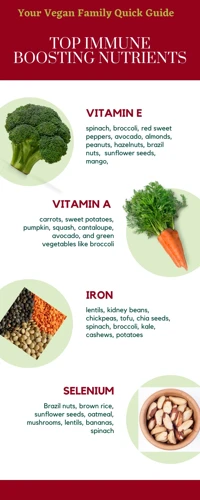
One of the most divisive vegetables out there, this cruciferous powerhouse is packed with nutrients that can boost your immune system and provide a range of other health benefits. It may not be everyone’s first choice on the dinner table, but there’s no denying the potential of this green giant. Let’s explore how broccoli can help you stay healthy and incorporate it into your diet in delicious ways.
How Broccoli Helps Boost Your Immunity
Broccoli is a cruciferous vegetable that contains high amounts of dietary fiber, vitamins, and minerals crucial for maintaining optimal health. More importantly, it is known for its remarkable immunity-boosting properties.
| Components in Broccoli | Benefits for Immune System |
|---|---|
| Sulforaphane | Stimulates the production of antioxidant enzymes that reduce oxidative stress and inflammation which can damage the immune system. |
| Vitamin C | Boosts the production of white blood cells, which help fight infections and protect the immune system against harmful pathogens. |
| Glutathione | A powerful antioxidant that protects immune cells from damage and boosts overall immune function. |
| Beta-carotene | Converts into vitamin A, which is essential for the maintenance of healthy immune function and the proper functioning of the digestive system. |
| Quercetin | Reduces inflammation which can weaken the immune system and cause it to function improperly. |
| Fiber | Promotes healthy digestion and supports the growth of beneficial gut bacteria that plays a role in overall immune function. |
The regular consumption of broccoli can significantly strengthen the immune system and reduce the risk of infections and chronic diseases caused by a weakened immune response. Incorporating broccoli into your diet can be done in various ways including stir-frying, steaming, or roasting.
Ways to Incorporate Broccoli in Your Diet
Adding broccoli to your diet can be a delicious and nutritious way to boost your immune system. Here are some creative ways to incorporate this cruciferous vegetable into your meals:
| Method | Description |
| Roasting | Cut broccoli into florets, toss with olive oil and sea salt, and roast in the oven until crispy. Enjoy as a side dish or add to a salad. |
| Stir-frying | Heat a wok or large frying pan over high heat. Add broccoli florets, sliced garlic, and your favorite stir-fry sauce, and cook for a few minutes until tender-crisp. |
| Steaming | Place broccoli in a steamer basket and steam for about 5 minutes or until tender. Serve as a side dish or add to soup or stir-fries. |
| Blending | Blend steamed broccoli with garlic, lemon juice, and tahini to make a nutritious and flavorful dip or spread. |
| Grilling | Brush whole broccoli florets with olive oil and grill over medium-high heat for a few minutes on each side until charred and tender. Serve as a side dish or chop and add to salads. |
| Adding to pasta dishes | Stir sautéed broccoli florets into your favorite pasta dish for a boost of nutrition and flavor. |
Try one or more of these methods to incorporate broccoli into your diet and reap the benefits of its immune-boosting properties.
Almonds

When it comes to boosting our immune system, many of us might only think of vitamin C and other traditional remedies. But did you know that a simple nut like almonds can also help improve our body’s natural defenses? These tasty treats are packed with essential nutrients and healthy fats that can provide numerous benefits beyond just being a delicious snack. Let’s dive into the details of how almonds can help keep our immune system strong and healthy.
How Almonds Help Boost Your Immunity
Almonds are a great source of antioxidants and vitamin E, which are essential for boosting the immune system. Vitamin E is known for its strong antioxidant properties, which help to protect the body from damage caused by harmful free radicals. Additionally, almonds contain magnesium and fiber, which are both important for maintaining a healthy immune system.
| Nutrient | Function |
|---|---|
| Vitamin E | Powerful antioxidant that protects the immune system from oxidative stress |
| Magnesium | Essential for the production of immune cells and enzymes that fight infections |
| Fiber | Supports the growth of beneficial gut bacteria, which are important for a strong immune system |
Including almonds in your diet can help to boost your immune system by providing your body with the essential nutrients it needs. Additionally, almonds make for a convenient and healthy snack option that can be easily incorporated into your daily routine.
Ways to Incorporate Almonds in Your Diet
Almonds are a tasty nut that can easily be incorporated into your diet in a variety of ways. Here are some suggestions for including almonds into your daily meals and snacks:
| Incorporating Almonds in Your Diet | Description |
| As a snack | Keep a small bag of almonds with you for a quick and healthy snack. |
| As a topping | Sprinkle almonds on top of your oatmeal, yogurt or salad for added crunch. |
| Almond butter | Spread almond butter on whole-grain toast, apple slices or celery for a protein-packed snack. |
| Almond milk | Use almond milk as a non-dairy alternative in smoothies, cereal or even in your morning coffee. |
| Almonds are a versatile nut that can add a delicious and healthy twist to any meal or snack. Experiment with different ways to incorporate almonds into your diet and enjoy the many benefits they provide for your immune system. |
Remember to always seek medical advice before making any significant changes to your diet, especially if you have any allergies or dietary restrictions.
Ginger
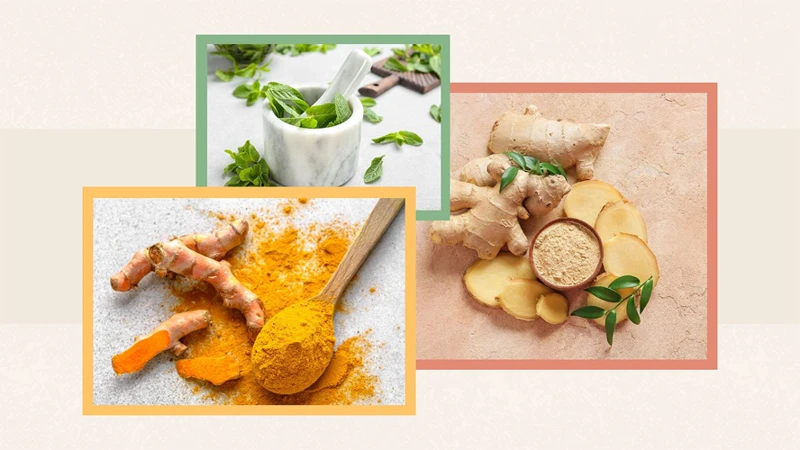
One of the most versatile and flavorful spices around, ginger has been a staple in many cultures’ cuisines for centuries. But did you know that ginger is also a powerful immune-boosting food? Packed with antioxidants and anti-inflammatory compounds, ginger can help improve your body’s defense against illnesses and diseases naturally. In this section, we’ll explore the various ways in which ginger can benefit your immune system and how you can incorporate this spicy root into your diet.
How Ginger Helps Boost Your Immunity
Ginger is a popular spice used in many cuisines for its unique flavor and medicinal properties. It has been used for centuries to help treat various ailments, including colds and flu, and is often used in traditional medicine to boost the immune system.
| Benefits of Ginger for the Immune System |
|---|
| 1. Contains compounds that have anti-inflammatory and antioxidant properties, which helps reduce inflammation in the body and prevent damage to cells by harmful free radicals. |
| 2. May help stimulate the production of immune cells, such as T-cells and antibodies, which play a crucial role in fighting off infections and diseases. |
| 3. Has been shown to have antiviral and antibacterial properties, which can help defend against viral and bacterial infections. |
| 4. May help reduce the severity and duration of cold and flu symptoms, such as sore throat, cough, and congestion. |
In addition to its immune-boosting properties, ginger also has other health benefits, such as improving digestion, reducing nausea, and reducing pain and inflammation in the body. Incorporating ginger into your diet is easy – you can add it to stir-fries, smoothies, teas, and other dishes. Drinking ginger tea is also a popular way to reap the benefits of this powerful spice. However, it’s important to note that ginger may interact with certain medications, so it’s best to consult with a healthcare provider before adding ginger to your diet.
Ways to Incorporate Ginger in Your Diet
Ginger is an incredibly versatile ingredient that can be incorporated into your diet in numerous ways. Here are some ways to add ginger to your meals:
| Method | Description |
|---|---|
| Ginger Tea | Boil sliced ginger in water for a warming and soothing tea that can be enjoyed at any time of day. |
| Ginger Smoothie | Add a small piece of ginger to your favorite smoothie recipe for an extra health boost. |
| Ginger Stir-Fry | Add minced ginger to your stir-fry dishes for a spicy kick and extra immune-boosting benefits. |
| Ginger Dressing | Mix minced ginger, soy sauce, rice vinegar, and sesame oil for a flavorful dressing that’s perfect for salads or as a dipping sauce. |
| Gingerbread Cookies | Bake some festive gingerbread cookies using ground ginger for a tasty and healthy treat. |
Incorporating ginger into your diet doesn’t have to be difficult or time-consuming. By adding it to recipes or simply drinking ginger tea, you can enjoy its health benefits while also enhancing the flavors of your meals.
Citrus Fruits
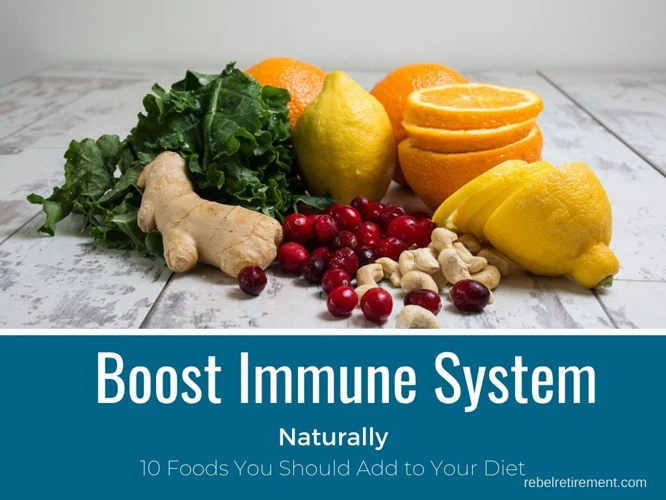
When it comes to naturally boosting your immune system, you may already know about the benefits of certain foods like garlic and spinach. But have you considered incorporating an abundance of citrus fruits into your diet? These juicy and acidic fruits are not only delicious, but they also possess numerous nutrients and properties to help strengthen your immune system. Whether you’re reaching for an orange or grabbing a grapefruit, let’s dive into the ways in which citrus fruits can benefit your overall health.
How Citrus Fruits Help Boost Your Immunity
Citrus fruits are highly recognized for their rich content of vitamin C. Vitamin C is a well-known antioxidant that is essential for the proper functioning of the immune system. The high content of vitamin C in citrus fruits helps to stimulate the production of white blood cells, which are the cells responsible for protecting the body against infections and diseases. Vitamin C helps to increase the levels of antibodies in the body, which are important in identifying and destroying harmful microorganisms.
Citrus fruits are also rich in flavonoids, which are known for their anti-inflammatory and antioxidant properties. Flavonoids help to boost the immune system by fighting off harmful bacteria and viruses. They also help to prevent the damage of cells caused by free radicals, which is crucial for maintaining a healthy immune system.
The following table provides a summary of the benefits of citrus fruits in boosting the immune system:
| Benefits of Citrus Fruits | How it Boosts the Immune System |
|---|---|
| Rich in vitamin C | Stimulates the production of white blood cells and increases the levels of antibodies |
| Rich in flavonoids | Anti-inflammatory and antioxidant properties help to fight off harmful bacteria and viruses and prevent damage caused by free radicals |
Incorporating citrus fruits such as oranges, lemons, limes, and grapefruits into your diet can help to give your immune system the boost it needs to fight off infections and diseases. Whether you eat them as a snack or include them in your meals, citrus fruits are a delicious and healthy addition to any diet.
Ways to Incorporate Citrus Fruits in Your Diet
There are several delicious and easy ways to incorporate citrus fruits into your daily diet to boost your immune system. Here are some ideas to get you started:
- Squeeze lemon or lime juice over your meals: A simple and easy way to incorporate citrus fruits is to add fresh lemon or lime juice to your meals. You can squeeze some on top of your salad, roasted vegetables, grilled chicken, or fish for a burst of flavor, vitamin C, and antioxidants.
- Make citrus fruit salad: Chop up a variety of citrus fruits, such as oranges, grapefruits, and mandarins, into small pieces and mix them together for a refreshing and healthy snack or side dish. You can also add some mint leaves or a drizzle of honey for extra flavor.
- Drink freshly squeezed orange juice: Whip up a glass of fresh orange juice using a citrus juicer or blender. Oranges are loaded with vitamin C and other nutrients that can help boost your immune system and keep you hydrated.
- Add citrus zest to your recipes: Use a zester or grater to add some zest from citrus fruits to your recipes, such as baked goods, marinades, or stir-fry dishes. The citrus oils in the zest can add a burst of flavor and health benefits to your meals.
- Snack on citrus fruits: Keep some citrus fruits, like clementines or tangerines, on hand for a quick and healthy snack. They are easy to peel and pack a lot of flavor and nutrition.
Incorporating citrus fruits into your daily diet can be a tasty and healthy way to boost your immune system and stay healthy. Try these ideas and experiment with different citrus fruits to find your favorites.
Yogurt
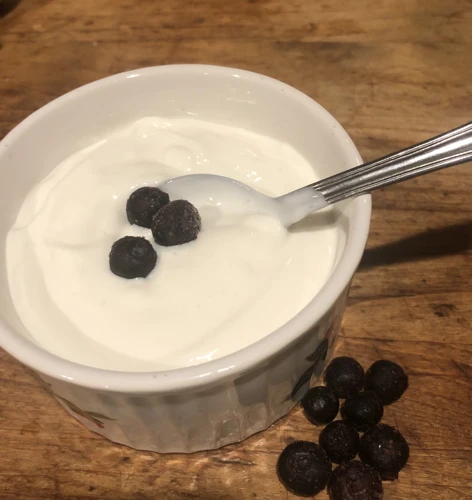
When it comes to a stronger immune system, most people don’t think of yogurt as having much impact. However, this humble dairy product can actually do wonders for your health. Rich in beneficial bacteria and nutrients, yogurt is an excellent food for supporting your immune system. Let’s take a closer look at how yogurt can help boost your immunity naturally.
How Yogurt Helps Boost Your Immunity
Yogurt is not just a delicious snack, it is also extremely beneficial for your immune system. It is a rich source of good bacteria (probiotics) that help in the proper functioning of the gut and improve immunity.
Here is how yogurt helps boost your immunity:
| Benefit | Description |
|---|---|
| Rich in Probiotics | Probiotics in yogurt helps in strengthening the intestinal lining and preventing harmful bacteria from entering the bloodstream. |
| Increases Production of Antioxidants | Yogurt increases the production of antioxidants in the body, which helps fight inflammation and infections. |
| Boosts Immune Cells | The probiotics in yogurt help in stimulating the production of immune cells like T cells and natural killer cells, which then ward off harmful pathogens. |
| Reduces the Severity of Respiratory Infections | Research shows that consuming yogurt can reduce the severity and duration of respiratory infections like common cold and flu. |
Incorporating yogurt in your daily diet can help boost your immune system and keep you healthy. However, it is important to choose plain, unsweetened yogurt as adding sugar can reverse the health benefits. You can have it as a snack or add it to your smoothie, salad, or dip.
Ways to Incorporate Yogurt in Your Diet
Yogurt is a delicious and versatile food that can be easily incorporated into your diet. Here are some great ways to enjoy this probiotic-rich food:
- As a snack: Enjoy a cup of yogurt with fresh fruit, granola, or nuts for a quick and healthy snack.
- In smoothies: Add yogurt to your favorite smoothie recipe for a creamy, protein-packed base.
- In salad dressings: Swap out mayonnaise or sour cream in your favorite salad dressing recipe for yogurt to lighten it up and add a tangy flavor.
- In baked goods: Use yogurt as a healthy substitute for sour cream or buttermilk in muffin, cake, or pancake recipes.
- In dips: Mix yogurt with herbs and spices for a delicious dip for veggies or pita chips.
- As a marinade: Use yogurt as a marinade for chicken or fish to tenderize and flavor the meat.
- In curries: Add yogurt to your favorite curry recipe for a creamy texture and tangy flavor.
- In soups: Stir yogurt into hot soups for a creamy and nutritious addition.
By incorporating yogurt into your diet in these various ways, you can reap the benefits of probiotics and improve your overall immune system.
Green Tea
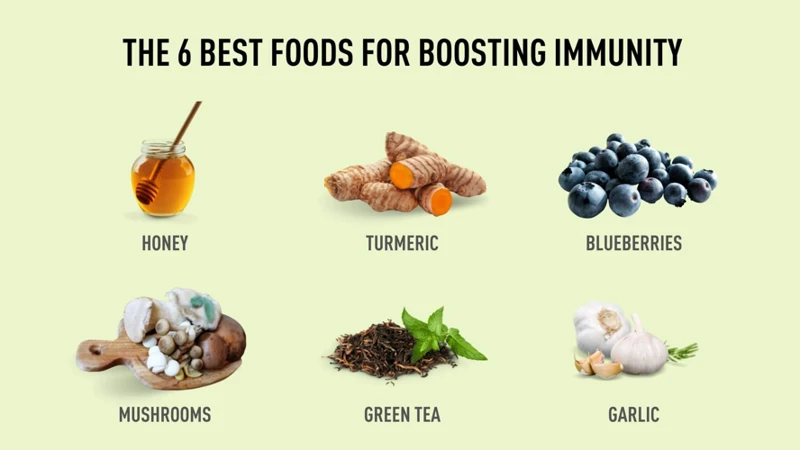
For centuries, green tea has been revered for its numerous health benefits. Its popularity continues to soar in modern times due to its natural ability to boost the immune system. Rich in antioxidants, this beverage is loved by many for its unique flavor and aroma. But what exactly makes green tea a powerful immunity booster? Let’s explore its remarkable properties and how it can help protect the body against illnesses.
How Green Tea Helps Boost Your Immunity
Green tea is a popular beverage that has various health benefits, including boosting your immune system. It contains antioxidant compounds called catechins, which protect your cells from damage that can weaken your immune system. One of the most abundant catechins in green tea is EGCG (epigallocatechin gallate), which is believed to have the most powerful effects in terms of immune system support.
When you consume green tea, the EGCG binds to the surface of your immune system cells, called T-cells. This binding boosts the activity of these cells, enabling them to fight harmful pathogens more effectively. Additionally, green tea contains L-theanine, an amino acid that promotes relaxation and reduces stress. High levels of stress can weaken your immune system, so by reducing stress, green tea indirectly strengthens your immune system as well.
Including green tea in your daily routine can be a simple and effective way to boost your immunity. You can brew it hot or cold, and even use it as a base for a healthy smoothie. To make sure you are getting the most out of your green tea, choose high-quality brands and avoid adding sugar, which can negatively impact your health.
Ways to Incorporate Green Tea in Your Diet
One way to include green tea in your daily diet is to simply brew a cup of it in the morning or afternoon as a replacement for your regular cup of coffee or tea. Here are a few more ways to incorporate this immune-boosting beverage into your diet:
- Add it to your smoothie: Blend green tea with your favorite fruits and vegetables for a nutritious and refreshing drink.
- Use it in marinades: Green tea can add a unique flavor to meats and vegetables when used as a marinade.
- Make a salad dressing: Mix brewed green tea with olive oil and vinegar for a healthy and flavorful salad dressing.
- Bake with it: Try adding green tea powder to your baked goods, like muffins or bread, for a boost of antioxidants.
- Chill and enjoy: Brew a batch of green tea and chill it in the refrigerator for a cool and refreshing drink on a hot day.
By incorporating green tea into your diet in these creative ways, you can enjoy the immune-boosting benefits of this beverage while also adding variety to your meals and snacks.
Red Bell Peppers

You may be surprised to learn that the red bell pepper, often overlooked in favor of its spicier counterparts, is a powerful ally in boosting your immune system naturally. Rich in vitamins and minerals, and packing more vitamin C than an orange, this versatile vegetable can be easily incorporated into your diet. Let’s take a closer look at how red bell peppers can help keep you healthy and strong.
How Red Bell Peppers Help Boost Your Immunity
Red bell peppers are a rich source of various nutrients that are essential for a healthy immune system. Here are some of the key nutrients found in red bell peppers and how they help boost your immunity:
| Nutrient | Function | Amount in 1 Medium Red Bell Pepper |
|---|---|---|
| Vitamin C | Antioxidant that helps protect cells from damage and infection | 152% of Daily Value |
| Vitamin A | Helps regulate immune system response and maintain healthy skin | 17% of Daily Value |
| Vitamin B6 | Assists in making red blood cells and supporting immune system | 11% of Daily Value |
| Folate | Helps produce healthy cells and prevent birth defects in pregnant women | 10% of Daily Value |
| Potassium | Regulates fluid balance and supports normal blood pressure | 6% of Daily Value |
| Dietary fiber | Supports regular digestion and promotes healthy gut bacteria | 3 grams |
The high amount of vitamin C found in red bell peppers is especially important for boosting your immune system. Vitamin C is a powerful antioxidant that helps protect cells from damage and infection. It also stimulates the production of white blood cells, which are essential for fighting off infections.
Additionally, vitamin A in red bell peppers helps regulate immune system response and maintain healthy skin. Vitamin B6 assists in making red blood cells and supports the immune system. Dietary fiber in red bell peppers supports regular digestion and promotes healthy gut bacteria, which is crucial for maintaining a strong immune system.
Incorporating red bell peppers into your diet can provide valuable nutrients that play a crucial role in maintaining a healthy immune system. Try adding them to salads, stir-fries, or roasted vegetable dishes for a delicious and nutritious boost.
Ways to Incorporate Red Bell Peppers in Your Diet
Red bell peppers are packed with vitamin C and other important nutrients that help boost your immune system naturally. Here are some delicious ways you can incorporate them into your diet:
| Recipes | Description |
| Stir Fry | Red bell peppers add vibrant color and crunch to any stir fry. Simply slice them up julienne style and toss them in with some protein and other vegetables for a healthy and delicious meal. |
| Roasted Red Bell Peppers | Roasting red bell peppers brings out their natural sweetness and adds a smoky flavor. You can add them to sandwiches, salads, or even eat them as a side dish. Just roast them in the oven until they are blistered and charred, then peel off the skin and enjoy! |
| Stuffed Peppers | Cut off the top of the peppers and clean out the inside. Fill the peppers with your favorite protein like ground turkey or quinoa, and then bake them in the oven until the peppers are soft and the filling is cooked through. This is a great way to get a hearty meal while still incorporating plenty of vegetables. |
| Grilled Red Bell Peppers | Similar to roasting, grilling red bell peppers brings out their natural sweetness and adds a smoky flavor. Simply brush them with olive oil and grill them until they are charred and tender. You can slice them up and add them to salads or sandwiches, or eat them on their own as a tasty snack. |
| Red Bell Pepper Soup | Red bell peppers make a delicious soup. Simply sauté them with some onions and garlic, then add in some vegetable or chicken broth and let simmer until it’s all soft. Then blend it together until it’s creamy and enjoy a warm, hearty soup. |
By incorporating red bell peppers into your diet, you’ll not only be boosting your immune system but also enjoying a variety of tasty and nutritious meals.
Sunflower Seeds
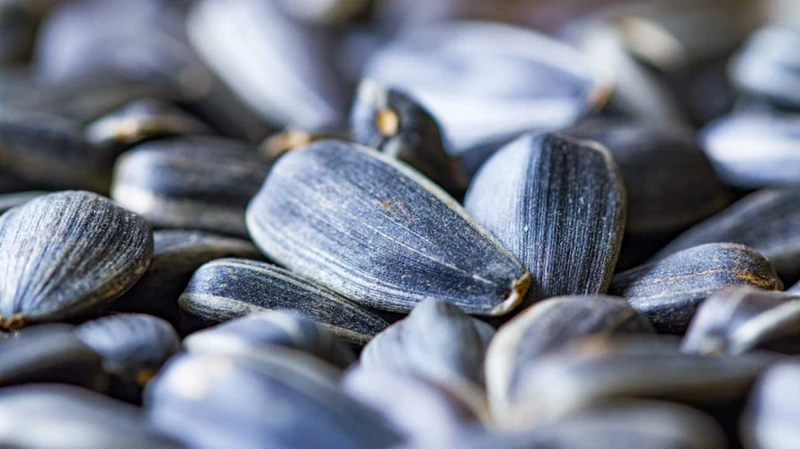
As surprising as it may sound, the tiny sunflower seed can pack a powerful punch when it comes to boosting your immune system. Although often overlooked, these little seeds are rich in nutrients and compounds that can help keep your body healthy and strong. Incorporating sunflower seeds into your diet may be just what you need to give your immune system the extra support it needs. Let’s take a closer look at how these little seeds can benefit your health.
How Sunflower Seeds Help Boost Your Immunity
Sunflower seeds are not just a popular snack, but they also have numerous health benefits, including being a great source of nutrients that can help to boost your immune system. Here are some ways that sunflower seeds can help boost your immunity:
- High in vitamin E: Sunflower seeds are one of the richest natural sources of vitamin E, which is a potent antioxidant that helps to protect your cells from free radicals and other harmful compounds.
- Rich in antioxidants: In addition to vitamin E, sunflower seeds contain several other antioxidants such as phenolic acids and flavonoids that protect against oxidative stress and inflammation.
- Contains selenium: Sunflower seeds are an excellent source of selenium, a mineral that helps to regulate immune function and reduce inflammation.
- Good source of zinc: Zinc is an essential mineral that plays a vital role in the functioning of the immune system. Sunflower seeds are a good source of zinc.
- Boosts gut health: Sunflower seeds contain prebiotic fiber that helps to promote the growth of beneficial gut bacteria. A healthy gut is essential for a strong immune system.
- Reduced risk of chronic diseases: Sunflower seeds are rich in phytosterols, which can help to lower cholesterol levels and reduce the risk of chronic diseases like heart disease and cancer.
Sunflower seeds can do wonders for your immune system because of their high content of antioxidants, vitamins, and minerals. Adding them to your diet is an excellent way to improve your overall health and well-being.
Ways to Incorporate Sunflower Seeds in Your Diet
When it comes to incorporating sunflower seeds in your diet, there are numerous ways to do so. Here are some ideas to get you started:
| Method | Description |
|---|---|
| Roasted Snack | Roast sunflower seeds for a tasty snack. Simply toss sunflower seeds with olive oil and a sprinkle of salt, and roast in the oven until crispy. |
| Salad Topping | Sprinkle sunflower seeds over your favorite salad for an added crunch. They pair particularly well with mixed greens, tomatoes, and citrus dressing. |
| Trail Mix Addition | Combine sunflower seeds with nuts, dried fruit, and dark chocolate for a healthy and satisfying trail mix on the go. |
| Smoothie Boost | Add a spoonful of sunflower seed butter to your smoothie for a boost of protein and healthy fats. It pairs particularly well with banana and chocolate flavors. |
| Bread Topping | Sprinkle sunflower seeds on top of homemade bread dough before baking for a nutritious and flavorful twist. |
Incorporating sunflower seeds into your diet can add a tasty and nutritious boost to your meals and snacks. Try out these ideas or get creative with your own recipes.
Shellfish
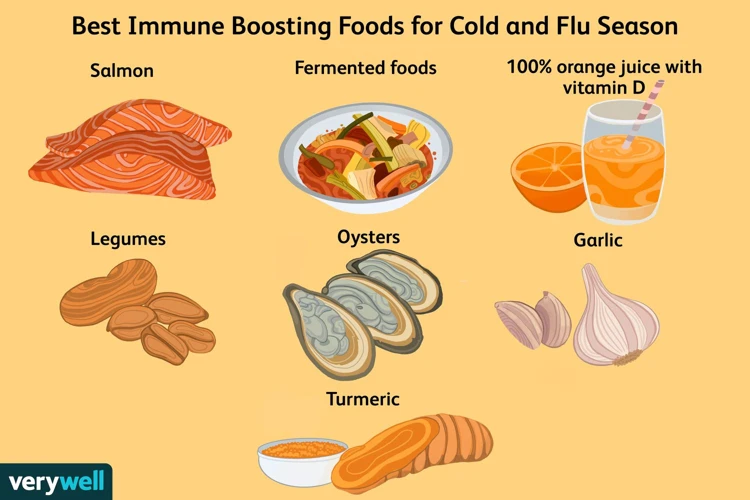
Seafood lovers, rejoice! There’s more reason than ever to indulge in a delicious seafood feast – especially when it comes to shellfish. These bountiful bivalves and crustaceans are not only tasty, but they are also packed with immune-boosting properties that can help keep your body strong and healthy. From mussels to shrimp, oysters to clams, the vast variety of shellfish available means there’s sure to be something for everyone to enjoy. Read on to discover the benefits of incorporating these oceanic delights into your diet.
How Shellfish Helps Boost Your Immunity
Shellfish such as oysters, clams, mussels, and crab are an excellent source of Zinc, a mineral that supports a healthy immune system. Zinc helps produce and activate immune cells which can help to fight off infections and diseases.
In addition to Zinc, shellfish is also a good source of other essential vitamins and minerals such as Iron, Vitamin B12, and Omega-3 fatty acids. These nutrients not only help in the production of immune cells but also support the overall health of the body.
It’s important to note, though, that some people may have an allergy to shellfish, so it’s essential to consult with a doctor before incorporating shellfish into your diet.
Incorporating shellfish into your diet in moderation can be an excellent way to boost your immune system naturally and support your overall health. Consider adding them to dishes like paella, cioppino, or a seafood boil for a delicious and nutritious meal.
Ways to Incorporate Shellfish in Your Diet
Including shellfish in your diet can provide a significant boost to your immune system. Shellfish are an excellent source of many essential vitamins and minerals, including vitamin B12, iron, zinc, and selenium. Plus, they are packed with high-quality protein, which is vital for building and repairing lean muscle tissue.
Here are some ways to incorporate shellfish into your diet:
| Type of shellfish | Ideas for incorporation |
|---|---|
| Shrimp | Add cooked shrimp to salads or pasta dishes, or serve grilled shrimp skewers as a tasty appetizer. |
| Crab | Use fresh or canned crabmeat to make tasty crab cakes, crab-stuffed mushrooms, or crab salad sandwiches. |
| Lobster | Enjoy freshly steamed or grilled lobster with melted butter or incorporate it into a creamy lobster bisque or a lobster mac and cheese recipe. |
| Mussels | Steamed mussels make for an impressive and flavorful appetizer, or add to a hearty seafood stew or pasta dish. |
| Scallops | Sear scallops in a hot skillet with a bit of butter and garlic for a simple yet elegant dish, or serve chilled as part of a seafood platter. |
When purchasing shellfish, it is essential to ensure that it is fresh and high-quality. Store it in the refrigerator right away and cook it within a day or two of purchase for the best flavor and optimal nutrient retention. By incorporating shellfish into your diet regularly, you can enjoy the immune-boosting benefits while trying out some delicious and versatile recipes.
Turmeric
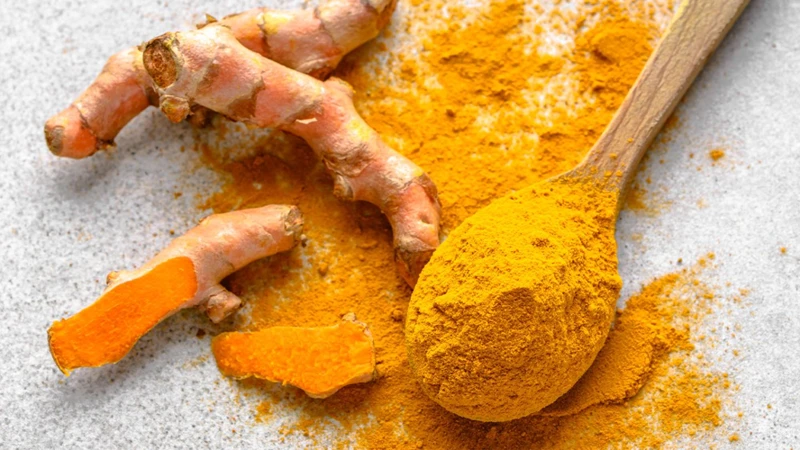
Turmeric has been used for centuries in traditional medicine as well as in cooking. This bright yellow spice, native to Southeast Asia, belongs to the ginger family and has anti-inflammatory properties. In recent years, turmeric has gained popularity in the Western world due to its potential health benefits, including boosting the immune system. Let’s dive into how turmeric can be beneficial for our immune system and some ways to incorporate it into our diets.
How Turmeric Helps Boost Your Immunity
Turmeric is one of the most popular and well-known spices that has been used in traditional medicine for centuries. It contains a compound called curcumin which has potent anti-inflammatory and antioxidant properties. These properties help in boosting your immune system and improving your overall health.
Curcumin is known to modulate the immune system, which means that it can regulate the activation and functions of immune cells. This allows your immune system to function optimally and fight off infections and diseases more effectively. Additionally, curcumin can also increase the production of certain proteins that are involved in the immune response.
Turmeric can also help in:
- Reducing inflammation: Chronic inflammation can weaken the immune system and make it less effective in fighting off infections. The anti-inflammatory properties of turmeric can help combat this.
- Preventing oxidative damage: Turmeric’s antioxidant properties can help protect your cells from damage caused by harmful molecules known as free radicals.
- Improving gut health: A healthy gut is essential for a strong immune system, and turmeric has been shown to have beneficial effects on the gut microbiome.
- Lowering the risk of chronic diseases: Several chronic diseases are linked to a weak immune system, and turmeric’s immune-boosting properties can help reduce the risk of these diseases.
Incorporating turmeric into your diet is easy, as it can be used in various forms. You can add it to your meals as a spice, or use turmeric supplements if you prefer. However, it is important to note that the bioavailability of curcumin is low, which means that your body may not absorb it efficiently. Consuming turmeric with black pepper, which contains piperine, can enhance the absorption of curcumin.
Turmeric is a powerful spice that can improve your immune system and boost your overall health. Incorporating it into your diet can be a simple and effective way to stay healthy and ward off infections and diseases.
Ways to Incorporate Turmeric in Your Diet
Turmeric has become increasingly popular in recent years for its immune-boosting properties. Here are some easy ways to incorporate it into your diet:
- Add it to your scrambled eggs: Mix in a pinch of turmeric to your scrambled eggs for a quick and easy breakfast boost.
- Sprinkle it on roasted veggies: Roasted vegetables make a healthy and delicious side dish, and adding turmeric is an easy way to give them an extra antioxidant boost.
- Try a turmeric latte: Many coffee shops now offer turmeric lattes that combine the spice with milk and sweetener for a tasty and healthy beverage.
- Make a turmeric curry: Turmeric is a staple in many Indian curries, and it’s easy to make your own at home using fresh or powdered turmeric.
- Blend it into smoothies: Add a teaspoon of turmeric to your favorite smoothie recipe for a quick and easy immune-boosting drink.
By incorporating turmeric into your diet in these simple ways, you can enjoy its many health benefits while also adding flavor and variety to your meals.
Blueberries

With their plump size and rich, blue color, it’s hard not to be drawn to blueberries in the produce aisle. But did you know that these little powerhouses are also packed with immune-boosting benefits? These tiny berries are not only delicious but also contain a variety of antioxidants and vitamins that can help keep your immune system strong and healthy. Let’s dive deeper into the benefits of blueberries and how you can easily incorporate them into your diet.
How Blueberries Help Boost Your Immunity
Blueberries are a delicious and nutritious fruit that contain a range of compounds that can help boost your immune system. Here are some ways blueberries can help boost your immunity:
- Vitamin C: Blueberries are a great source of vitamin C, which is a powerful antioxidant that helps protect your cells from damage. Vitamin C is also important for the production of white blood cells, which are essential for fighting infections in your body.
- Anthocyanins: Blueberries are rich in anthocyanins, which are natural plant compounds that give blueberries their deep blue color. Anthocyanins have antioxidant and anti-inflammatory properties, which can help protect your body from harmful bacteria and viruses.
- Fiber: Blueberries are a good source of fiber, which is important for maintaining healthy digestion and gut health. A healthy gut plays an important role in supporting your immune system.
- Quercetin: Blueberries also contain quercetin, which is another natural plant compound with antioxidant and anti-inflammatory properties. Quercetin has been shown to stimulate the immune system and improve overall immunity.
Incorporating blueberries into your diet is an easy and delicious way to give your immune system a boost. You can enjoy them fresh or frozen, added to smoothies or yogurt, or as a topping for oatmeal or pancakes.
Ways to Incorporate Blueberries in Your Diet
Blueberries are a delicious and easy-to-incorporate food that can help boost your immune system. Here are some suggestions to add them to your daily diet:
| 1. Smoothies | Mix blueberries in your smoothies along with some spinach or kale for extra nutritional benefits. |
| 2. Salad | Add blueberries to your salad for a sweet and tart flavor, and top it off with a balsamic or raspberry vinaigrette. |
| 3. Topping | Sprinkle blueberries on top of your Greek yogurt or oatmeal for a healthy, antioxidant-rich breakfast. |
| 4. Snacks | Make blueberry snacks by dipping them in dark chocolate or freezing them to enjoy as a cool, refreshing treat. |
There are many ways to add blueberries to your diet, so get creative and enjoy the health benefits of this tasty fruit!
Dark Chocolate
As unlikely as it may seem, chocolate could actually help boost your immune system. Specifically, dark chocolate contains compounds that have been associated with several health benefits, including increased immunity. So, if you’re a chocolate lover, you’ll be happy to know that indulging in some dark chocolate might not be such a bad thing after all. Let’s take a closer look at the ways in which dark chocolate can support your immune system.
How Dark Chocolate Helps Boost Your Immunity
Dark chocolate is not just a delicious treat; it also has the potential to boost your immune system. Here are some of the ways in which consuming dark chocolate may strengthen your immunity:
- Rich in antioxidants: Dark chocolate contains powerful antioxidants called flavonoids, which help to reduce inflammation in the body. This can help to prevent chronic diseases and support your immune system.
- Boosts T-cell activity: T-cells are a type of white blood cell that play a crucial role in fighting off infections. Dark chocolate has been shown to increase T-cell activity, which can help to improve your immune response.
- Contains zinc: Zinc is an essential mineral that plays a key role in supporting a healthy immune system. Dark chocolate is a good source of zinc, providing around 12% of the daily recommended intake in a 1-ounce serving.
Incorporating dark chocolate into your diet can be a tasty way to give your immune system a boost. Just make sure to choose high-quality dark chocolate with a cocoa content of 70% or higher to reap the maximum benefits. Keep in mind that while dark chocolate can be a healthy addition to your diet, it should still be consumed in moderation as it is high in calories and fat.
Ways to Incorporate Dark Chocolate in Your Diet
Incorporating dark chocolate in your diet does not mean scarfing down a whole bar every day. Moderation is key here. The recommended amount is about one ounce or a small square of dark chocolate, which is about 70% cocoa. Here are some ways to enjoy this delicious treat without overindulging:
| Method | Description |
|---|---|
| Pair it with fruit | Slice up some strawberries or bananas and dip them in melted dark chocolate for a sweet and healthy snack. |
| Add it to your baked goods | Add some dark chocolate chips to your muffins, cookies or brownies for a decadent treat. |
| Make hot cocoa | Heat up some milk and stir in a small amount of dark chocolate for a warm and comforting drink. |
| Mix it in your oatmeal or yogurt | Sprinkle some dark chocolate shavings on top of your oatmeal or yogurt for a delicious and nutritious breakfast. |
| Eat it plain | Enjoy a small square of dark chocolate on its own as a satisfying and indulgent treat. |
Remember, while dark chocolate has numerous health benefits, it is still a treat and should not be consumed in excess.
Conclusion
In conclusion, incorporating foods that boost your immune system naturally can be a great way to improve your overall health and well-being. From garlic and spinach to dark chocolate and blueberries, there are many different foods that have properties that can help keep your immune system strong.
However, it’s important to remember that a healthy diet should always be balanced and varied. Relying solely on specific foods or supplements to boost your immunity may not be sufficient. It’s also important to consider other lifestyle factors that can impact the strength of your immune system, such as getting enough rest, managing stress, and staying physically active.
It’s also important to consult with a healthcare professional before making significant changes to your diet or lifestyle. While many of the foods discussed in this article have been found to have positive effects on the immune system, individual results may vary. A healthcare professional can offer personalized advice based on your individual health goals and needs.
Incorporating these foods into your diet can be a great way to boost your immune system naturally, but it’s just one part of a larger picture of overall health and wellness. By making small changes to your diet and lifestyle, and regularly seeking the advice of healthcare professionals, you can take steps towards leading a healthier, more vibrant life.
Frequently Asked Questions
What is the immune system and how does it work?
The immune system is the body’s natural defense system against harmful substances such as viruses, bacteria, and parasites. It works by identifying these harmful substances and attacking them to eliminate them from the body.
Why is it important to keep the immune system strong?
A strong immune system is important because it helps the body fight off infections and diseases more effectively. It also helps reduce the likelihood of developing chronic illnesses such as heart disease, diabetes, and cancer.
Can certain foods really boost the immune system?
Yes, certain foods can help boost the immune system by providing the body with the necessary vitamins, minerals, and other nutrients it needs to function properly.
What are some common immune-boosting foods?
Common immune-boosting foods include garlic, spinach, broccoli, almonds, ginger, citrus fruits, yogurt, green tea, red bell peppers, sunflower seeds, shellfish, turmeric, blueberries, and dark chocolate.
How do garlic and spinach help boost the immune system?
Garlic contains compounds that help stimulate the production of white blood cells, which are essential in fighting off infections. Spinach contains vitamins and minerals such as vitamin C, beta-carotene, and zinc, which are also essential for immune function.
What are the benefits of incorporating almonds into your diet?
Almonds are packed with vitamin E, which is known for its immune-boosting properties. Almonds are a good source of healthy fats and protein, making them a great snack for sustaining energy levels throughout the day.
How does ginger help boost the immune system?
Ginger contains compounds that have antioxidant and anti-inflammatory properties, which help support immune function by reducing inflammation and protecting cells from damage.
What makes citrus fruits a good immune-boosting food?
Citrus fruits such as oranges, lemons, and grapefruits are rich in vitamin C, which is a powerful antioxidant that helps protect cells from damage and supports immune function.
What are the benefits of consuming probiotics found in yogurt?
Probiotics are live bacteria and yeasts that are good for the body, especially the digestive system. Yogurt is a good source of probiotics, which help support immune function by promoting a healthy gut microbiome.
What is the best way to incorporate turmeric into your diet?
Turmeric can be incorporated into your diet by adding it to soups, stews, or rice dishes or by drinking it as a tea. It can also be taken in supplement form.







